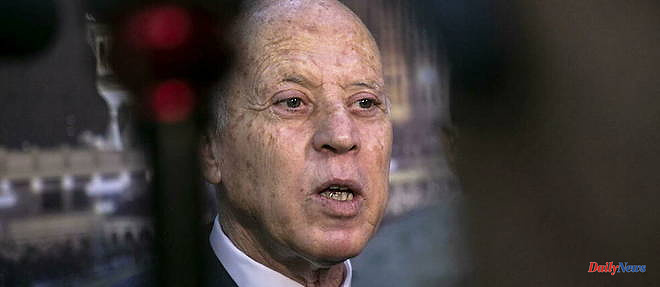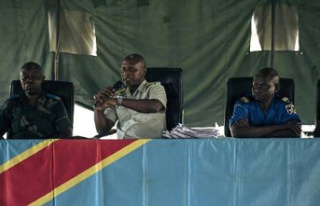"As far as the IMF is concerned, diktats from abroad that only lead to further impoverishment are unacceptable," Tunisia's Head of State Kaïs Saïed said on Thursday (April 6th). press on the sidelines of a ceremony in Monastir (Centre-Est), marking the 23rd anniversary of the death of the father of Tunisian independence Habib Bourguiba. A stone in the pond a few days before the opening of the spring meetings of the International Monetary Fund (IMF) and the World Bank in Washington, April 10.
Tunisia has been negotiating with the International Monetary Fund for many months for a rescue plan of 1.9 billion dollars (1.75 billion euros), the granting of which the international institution conditions on reforms. economic benefits and the lifting of certain state subsidies. "They want us to listen to their speech," the leader continued, "we won't listen to anyone but God and the voice of the people."
Tunisia, indebted to about 80% of its GDP, obtained an agreement in principle from the IMF in mid-October for a new loan of about 2 billion dollars to help it overcome the serious financial crisis it is going through. . But talks have stalled due to Tunisia's lack of firm commitment to implement a reform program to restructure Tunisia's more than 100 heavily indebted state-owned enterprises and lift subsidies on certain commodities.
"You have to find other ideas, because social peace is not a game or something that can be taken lightly," said the Tunisian president, recalling the murderous "bread riots" under the Bourguiba regime. , in the 1980s. The alternative would be to "rely on ourselves", he added in response to a question. In December 1983, the Tunisian authorities had decided to abolish the subsidy on cereal products. As a result, the prices of bread, semolina and pasta had soared, immediately causing riots which reached their peak on January 3, 1984. A state of emergency was declared. The official death toll was several dozen dead, but it would be higher, according to NGOs.
The day after these remarks were made, concern spread to economic and financial circles, as Tunisian bonds collapsed. Is the country headed for default? In any case, the delay in negotiations with the IMF or the powerful union of the Tunisian General Labor Union (UGTT) raises concerns, while the economic and social situation is explosive: 90% of new loans are now used to repay the previous ones. And it would miss nearly 24 billion dinars (more than 7 billion euros) to complete a budget of 69 billion (20.8 billion euros), set for 2023.
"The Tunisian economy risks collapsing" without an IMF bailout, US Secretary of State Antony Blinken warned in the US Senate in March. Same story with Europeans. The head of European diplomacy, Josep Borrell, came to drive the point home, citing the risk of a collapse of the State likely to "cause migratory flows towards the European Union and cause instability in the Mena region [ Middle East and North Africa]", if Tunisia does not quickly finalize an agreement with the IMF.
Kaïs Saïed assumed full powers on July 25, 2021, by dismissing the Prime Minister and freezing the Parliament, which was subsequently dissolved, thus shaking the democracy that emerged from the first revolt of the Arab Spring. He had a new Constitution adopted by referendum in July 2022 establishing a hyper-presidentialist system and reducing the powers of Parliament, which was the real center of power in the system in place after the fall of the dictatorship of Zine el- Abidine Ben Ali in 2011. On February 21, the Tunisian president set fire to the powder room by denouncing the presence of "hordes" of migrants whose "criminal enterprise" aimed to "change the demographic composition" of the country. This anti-migrant speech by President Kaïs Saïed and the country's economic difficulties have led to an increase in boat departures for the Italian coasts.
The main opposition parties denounce an "authoritarian drift" which is wobbling the young democracy that emerged from the first revolt of the Arab Spring in 2011. Thanks to an anti-system vote, Kaïs Saïed, 65, was elected in 2019 for the presidency for a term of five years. Asked about a possible candidacy for his own succession during the presidential election theoretically scheduled for 2024, the current head of state remained vague about his intentions. "It's too early to say if I'll run again," he said. "I don't feel like I'm competing with anyone, I feel like I have a responsibility and I won't give it up. "It goes without saying that there will be elections and the people will make their choice, but the idea of running me again does not concern me. The day will come when I will pass the torch to whomever the Tunisian people choose after me,” he added.












